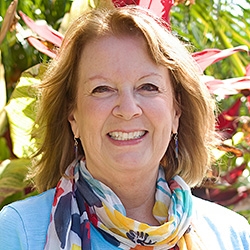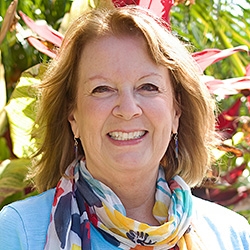

Search Results: change
-
-
Our ability to reduce our reliance on money, or even exit the logic of money and exchange in our own thinking, is limited by the degree of trust we have that our needs will be met without it. The more we can enter into sufficient trust, the more we can enter into a web of sharing resources -- borne from a place of love. Read on for more.
-
Love keeps the thread of connection intact in times when all around us we see the human fabric becoming threadbare. When we dig deep with love into guessing what others care about that had given rise to their actions, it changes us. It brings us closer to understanding the incomprehensible -- and closer to vision, imagination, humility, curiosity, commonality, and loving action. Read on for more on applying this to people we deem "conspiracy theorists", and those who are on the other end of the political divide.
-
- Discover what is yours to do in response to our growing global crises
- Weave nonviolence more deeply into how you live and lead
- Receive ongoing support within and beyond the course in how to be effective and alive while doing what’s yours to do
- Increase your capacity to face and mourn current reality as a source of greater choice and energy
- Be a part of transforming the legacy of scarcity, separation, and powerlessness into a livable future
-
Trainer Tip: "Sometimes we are dissatisfied in our primary relationship, yet the thought of making a change is scary, so we stay in it. Sometimes we think we're afraid to learn the truth, so we don't ask direct questions."
-
Miki will take you step-by-step through four vital systems that support radical collaboration and foster meaning. You’ll learn how to design a decision making process, create clear statements of intent, and create a process for resolving conflict.
-
Trainer Tip: Commit to doing one thing right now that will bring you closer to meeting a need today. Do it today. Don’t put it off. This is your life.
-
We can't alone (nor with lone communities) transform the hidden structures of violence and domination. Dialogue alone isn't disruptive enough. We can easily be in dialogue with Trump supporters while the planet burns up, millions are still hungry, and we go extinct. NVC seriously risks reinforcing vast inequities and abuses if we're not radically engaging systemic constraints, and impacts of our choices that go beyond our immediate circle. Read on for ways to leverage NVC practices to expand true social change.
-
“Nonviolence” is not just a political tactic. It is a “soul force,” a courageous and compassionate stand in the face of what seems to us unjustly unequal, oppressive, and violent. It is the force of love meeting and transforming what appears to not be love.. It is the force of love meeting and transforming what appears to not be love. It is speaking and listening with courage, compassion, and an open heart and mind and rooted in our truth in a way that bridges understanding. And doing so without demand nor trying to convince -- all in the face of any anger, fear, oppression, inequality, violence or disagreement.
-
Whether its pandemics, climate change, damage to the environment or other massive challenges that humanity faces, what are we to do if we can't agree on even the most basic information and knowledge? From empathic understanding we can focus on shared, universal human needs (where there is no conflict or disagreement) underlying our perceptions, and feelings. Then we can see if there are ways we can agree on to meet those needs.
-
The American mythos of Independence Day is that liberty, equality, and opportunity are for all. Yet since the country's formation, these needs have been for some at the expense of others. It started with the brutal robbery and genocide of Native Americans and slavery of Africans. And this theme continued for generations in various forms, including how we related to other peoples, countries, and the ecosphere. To achieve true justice, liberty, and opportunity for all we may need to overcome the ego's sense of separation. Compassionate noncooperation may also be key.
-
When empathy falls short, uncover strategies and heal patterns through unconscious contract work.
-
What happens when empathy isn't enough?When you and the people you love keep getting into the same argument again and again with no resolution or change, it can feel deeply distressing. It may even be challenging to hold on to hope. Realizing what trauma is – a phenomenon that affects us all – increases your self-compassion and gives you solid ground to stand on. Then, when you begin to integrate the tool of unconscious contract work, you can become intimate with your own survival strategies and those of the people you love.
-
CNVC Certified Trainer Shantigarbha Warren offers a report of his recent NVC training trip to Israel/Palestine, India and Sri Lanka and clarifies how NVC can support social change in three very different contexts. Included is an exercise, based on Gandhi’s teaching.
-
There's the real need. And then there's the privilege that’s offered as a substitute for it. Privilege substitutes support the existing structure of society. It can look to us as if giving up the privilege would amount to giving up everything -- if we don't believe the real needs can even be experienced. If we connected directly to the needs, we could become subversive, agents of change.
-
Anger can result in violence or in a movement towards positive change. We can see this happen in the push for racial justice. When you perceive anger as a form of violence your nervous system becomes activated. Your perspective narrows and old conditioning can take over leading to overwhelm, defensiveness, hatred, or violence. Read on for four ways to to respond to our own or others' anger in a way that mobilizes desired change.
-
Goals and purposes can arise from intentions, but are different. Intentions arise from what's authentic, alive and aligned for you. Intentions can give you a sense of expansion, ease, and flow -- and are an essential part of any change process. Clear intentions can support decisions, management of resources, plus it can direct your attention effectively and with integrity. Read on for practices to find and implement your intention.
-
What have you lost this year during this COVID-19 pandemic? Are you grieving too? Recognition of loss can helped contextualize our emotions. When we can meet grief with understanding, patience and tenderness, when we create space to mourn our losses -- and to begin to process, heal and metabolize loss. This can help us make sense of change and orient to a new reality. Grief is a longing for what we love.
-
Part of nonviolence is having an infinite circle of care that includes simultaneous care of ourselves, others and groups: no one is beyond the pale. Plus, it's about having an infinite trust in the possibility that we can reach someone's heart even if we don't now know how -- since regardless of what this other person has done, they have the same needs. Without this kind of trust, nonviolence would crumble as way to create change.
-
How DO we live our lives? What is an effective response to what is happening in the world? Listen in as Miki dialogs with a participant asking, "What is mine to do?", and honors the dissonance we feel when working to change.
Quick Links

Stay in Touch!
We value your privacy, won't share your email address and you can easily unsubscribe any time.
















